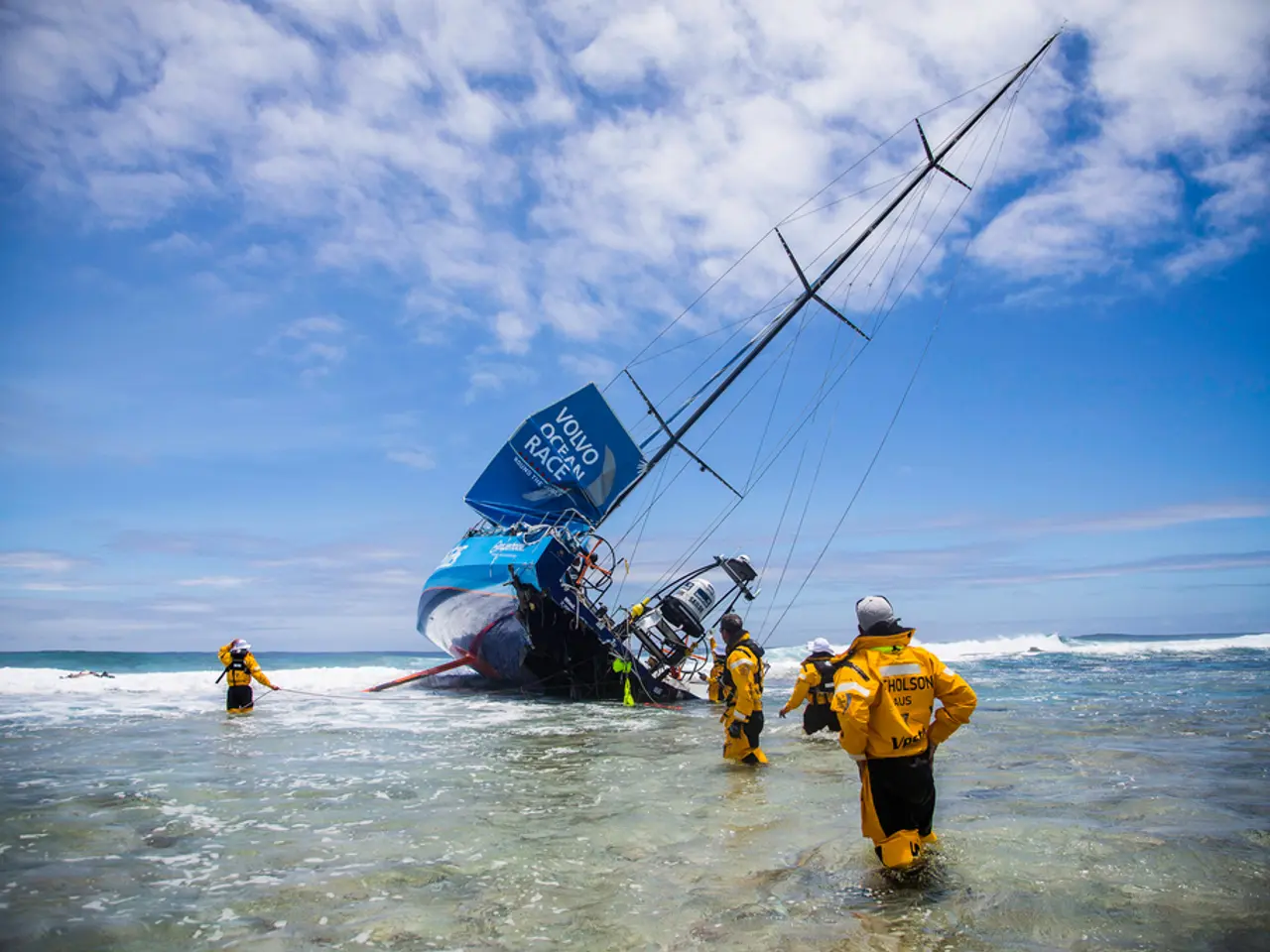Thousands of People from Tuvalu, Faced with Rising Sea Levels, Seek a Relocation Pathway via Australia
In the vast Pacific Ocean, four low-lying island nations - Tuvalu, Nauru, Kiribati, and the Marshall Islands - are battling against the encroaching waves. These islands, home to nearly 11,000 Tuvaluans, 113,000 Kiribatians, 106,000 Marshallese, and 10,000 Nauruans, are at the forefront of the global climate crisis, facing existential threats due to rising sea levels and climate change.
Tuvalu, a nation with an average elevation of less than 10 feet (3 meters), has already seen the devastating effects of global warming. Over the past three decades, Funafuti, the capital, has experienced a sea-level rise of about 5.5 inches (14 centimeters), which is approximately 1.5 times the global average rate. This rise has led to increasingly frequent flooding, land loss, and salinization of freshwater supplies, making the island more vulnerable to droughts, water shortages, and disease outbreaks, according to UNICEF Australia.
In response, Tuvalu has implemented the Tuvalu Coastal Adaptation Project (TCAP), which includes improvements to coastal hazard monitoring, land reclamations, and coastal protections for outer islands. However, scientists predict that by 2050, half of Funafuti's area will become submerged by daily tides under a 1-meter sea-level rise scenario. Worst-case scenarios project 90% submersion.
Acknowledging the threat climate change poses to its existence, Australia recently launched a "special mobility pathway" climate visa, allowing Tuvaluans (up to 280 annually) to live, work, or study in Australia. This move underscores efforts to prepare for population displacement while upholding sovereignty. Tuvalu and Australia ratified the Falepili Union Treaty in 2023 for climate collaboration and secure, dignified movement of people between both countries.
As more and more Tuvaluans make the difficult decision to leave their homes, citizens of many other island nations will get a glimpse of what's to come. Studies suggest many of Tuvalu's islands will become uninhabitable due to flooding, saltwater intrusion, storm surge, and erosion before the end of the century.
Similar to Tuvalu, Nauru, Kiribati, and the Marshall Islands face risks comparable to these threats. These low-lying island countries are seeking international recognition of their sovereignty despite potential total land loss, pressing for changes to international law that currently require defined territory for statehood.
In a bid to preserve its land and statehood, Tuvalu is working to create a digital copy of the country. The aim is to recreate its land, archive its rich history and culture, and move all governmental functions into a digital space.
NASA researchers predict that Pacific Island nations will see at least 6 inches (15 centimeters) of sea level rise in the next 30 years alone. This has made large-scale planned migration a likely inevitability as sea levels rise. Countries like Australia are beginning to offer formal migration pathways, reflecting a new approach to climate displacement.
Upon arriving in Australia, visa holders will receive immediate access to education, Medicare, the National Disability Insurance Scheme (NDIS), the family tax benefit, a childcare subsidy, and a youth allowance. More than 3,000 Tuvaluans applied for these visas when they became available on June 16, 2023.
Grace Malie, a Tuvalu citizen, stated in 2024 that everyone in Tuvalu lives by the coast or along the coastline, making them heavily affected by climate change. As the situation worsens, these island nations are bracing for a future that involves a combination of adaptation efforts, international legal innovation, and migration agreements to preserve their peoples and global identity despite rising seas.
- Gizmodo reported on the digital preservation of Tuvalu, a nation battered by climate change, as an attempt to recreate its land, history, and government in a digital space due to the threat of sea-level rise.
- Environmental-science studies predict that Pacific Island nations, like Tuvalu, Nauru, Kiribati, and the Marshall Islands, will experience at least 6 inches (15 centimeters) of sea-level rise in the next 30 years, making large-scale migration a likely inevitability.
- In response to climate change's devastating effects, Australia launched a "special mobility pathway" climate visa, enabling Tuvaluans (up to 280 annually) to live, work, or study in Australia, a move aimed at addressing population displacement while upholding sovereignty.
- As climate change escalates, politicians and policymakers are addressing the issue of climate displacement through policy-and-legislation, such as international law changes to recognize sovereignty despite potential total land loss for low-lying island countries.
- General-news outlets, like Earther, cover the ongoing struggles of island nations, such as Tuvalu, Nauru, Kiribati, and the Marshall Islands, that are at the forefront of the global climate crisis, facing existential threats due to rising sea levels and climate change.






